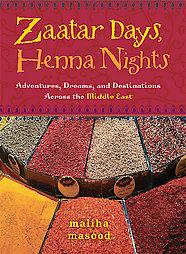Zaatar Days, Henna Nights: Adventures, Dreams, and Destinations across the Middle East

Pakistani-American Maliha Masood needed a change in her life. She resigns from her lackluster job, cashes in her savings and books a one-way ticket to Paris. While in Europe, her strong desire for adventure and self-discovery propels her to hop on a flight to Cairo, Egypt, but the journey does not stop there. In Zaatar Days, Henna Nights, Masood recounts the literal and metephorical journey she takes across the Middle East, living in Egypt, Jordan, Lebanon, Syria and Turkey. She describes, with harrowing detail, her experiences riding Cairo's bustling subway system, floating in Jordan's Dead Sea, roaming around Damascus' old city, strolling down Beirut's posh commercial streets, praying in Aleppo's Great Mosque and laying in the sand of Turkey's Patara beach. Yet Masood is certainly not your average tourist. Instead of isolating herself in luxurious hotels while solely visiting popular sites, she forces herself to become immersed in the varying cultures by renting apartments in average neighborhoods in which she must communicate in order to survive.
Masood always finds room to write about the specifics. The reader cannot help but feel as if they are walking and sitting alongside her, smelling the various spices in the souq (Middle Eastern marketplace) and feeling the anxiety that comes when one cannot rely on language to haul themselves out of a sticky situation. While the details are important, Masood's profound insights are the jewels of this text. She struggles with the privilege of being a tourist, especially when she opens her eyes to the widespread poverty that often surrounds her. She elaborates on insider versus outsider tensions, religious versus cultural practices, language as a social bond and a barrier, Western ideas about the Middle East and vice-versa, among other things.
Ultimately, this text is a personal and spiritual quest in an attempt to transcend duality. As a Pakistani-American, Masood writes that “[duality] seems to be the thesis of my life,” and she often divides her identity into her Eastern and Western selves. However, her travels open her up to the possibility that we are all more alike than we assume, that perhaps we share common desires and hopes. The readers of Zaatar Days, Henna Nights will certainly come away with more than a tourists gaze of the Middle East. They will understand its vast variations, complexities, and subtleties in a way that only a person with both insider and outsider status (like Masood) is fortunate and brave enough to experience.